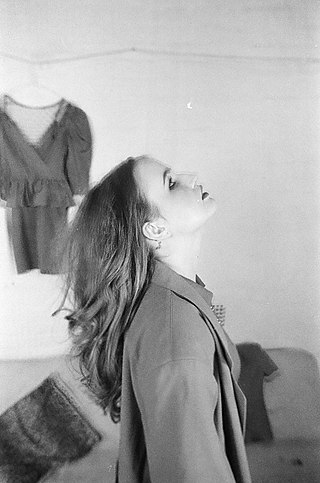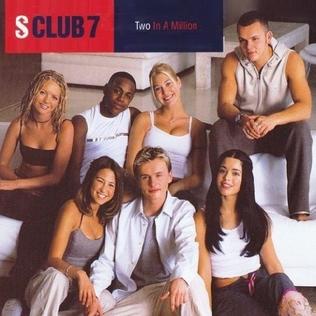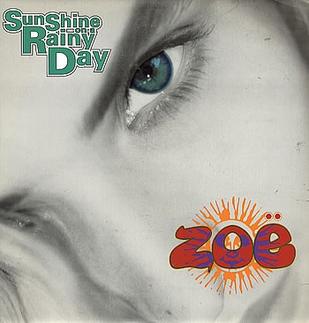
Amy Jane Studt is an English singer, songwriter and musician. Growing up in a musical family, with her father a violinist and conductor who had toured with Roy Orbison, and her mother a pianist, Studt began writing music at the age of six, teaching herself piano, guitar, and oboe. At 12 years old she contracted the rare bone disease osteomyelitis in her hip, leaving her bedridden. Studt used this time for her hobbies, and two years later, with the advice of her father, she recorded her first two demo albums which would go on to get her signed to Polydor. Studt released her first single "Just a Little Girl" in July 2002. It was followed almost a year later by "Misfit", which came to be her highest-charting single, reaching No. 6 in the UK charts. That same month, her debut album False Smiles was released, selling over 260,000 copies and being certified Gold. Two more singles were released, "Under the Thumb" in late 2003 and "All I Wanna Do" in early 2004, but only to diminishing sales that prompted Polydor to drop Studt in February 2004, all before her 18th birthday.

"Fantasy" is the debut single of Canadian pop duo Appleton. It was released on September 2, 2002, and peaked at number two on the UK Singles Chart, held off the top spot by Atomic Kitten's "The Tide Is High ".

"Girlfriend" is a song recorded by American singer-songwriter Alicia Keys for her debut studio album Songs in A Minor (2001). It was written by Keys, Jermaine Dupri, and Joshua Thompson, while production was helmed by Dupri and Keys. The song is built around an interpolation from Ol' Dirty Bastard's 1995 song "Brooklyn Zoo". Due to the inclusion of the sample, Robert Diggs and Russell Jones are also credited as songwriters. "Girlfriend" was released as the fourth and final single from Songs in A Minor outside the United States on November 25, 2002, by J Records.

"I'm Right Here" is a song by Irish singer Samantha Mumba, the lead single released from her aborted second studio album, Woman (2002). The single was released on 12 August 2002 in the United States and on 14 October 2002 in the United Kingdom. The song reached number three in Ireland and number five in the United Kingdom. It also reached number 32 in Australia and number 51 in Germany.

"Always Come Back to Your Love" is a song by Irish singer Samantha Mumba, released as the third single from her debut studio album, Gotta Tell You (2000), on 19 February 2001. The song was written by Hallgeir Rustan and producers Stargate, who recorded it at the producers' Norwegian studio. "Always Come Back to Your Love" was Mumba's second and final song to top the Irish Singles Chart, peaking at number one on the chart dated 22 February 2001. It also entered the top 10 in United Kingdom and Romania, reaching numbers three and 10 on their respective charts.

"Murder on the Dancefloor" is a song written by Gregg Alexander and Sophie Ellis-Bextor, produced by Alexander and Matt Rowe for Ellis-Bextor's first album, Read My Lips (2001). Released on 3 December 2001, the song peaked at number two on the UK Singles Chart and stayed on the chart for 23 weeks. The song became a top-10 hit worldwide, charting within the top three in Australia, New Zealand, and four European countries. In the United States, where the song was serviced to radio in September 2002, the single reached number nine on the Billboard Dance Singles Sales chart. "Murder on the Dancefloor" is reported to have been the most played song in Europe in 2002.

"Just a Little Girl" is the debut single of English singer-songwriter Amy Studt. Released on 1 July 2002, the single reached a peak of No. 14 on the UK Singles Chart. It is taken from her debut album, False Smiles, which was released a year later.

"All I Wanna Do" is a song performed by American singer and songwriter Sheryl Crow. It was written by Crow, David Baerwald, Bill Bottrell, and Kevin Gilbert, with lyrics adapted from Wyn Cooper's 1987 poem "Fun". Released in July 1994 by A&M, it was Crow's breakthrough hit from her 1993 debut album, Tuesday Night Music Club. The song is Crow's biggest US hit, peaking at number two on the Billboard Hot 100 for six consecutive weeks from October 8 to November 12, 1994, and it also topped the Billboard Adult Contemporary chart. It was the winner of the 1995 Grammy for Record of the Year and Best Female Pop Vocal Performance and was nominated for Song of the Year.

"Misfit" is a song by English singer Amy Studt, released as the second single from her debut album, False Smiles (2003), on 9 June 2003. The song reached number six on the UK Singles Chart and is Studt's most successful single to date. It was also her most successful single internationally, peaking within the top 50 in Australia, Ireland, the Netherlands, and Sweden.

"Two in a Million" is a song by British pop group S Club 7, released as the third single from their debut studio album, S Club (1999), on 13 December 1999. The single was released as a double A-side with "You're My Number One" in UK, but in other countries, it was issued as a stand-alone single. The single debuted at number five on the UK Singles Chart and peaked at number two in January 2000. In New Zealand, "Two in a Million" became the band's third consecutive number-one single, after "Bring It All Back" and "S Club Party".

"Get Over You" and "Move This Mountain" are two songs by British pop singer Sophie Ellis-Bextor. In most countries, "Get Over You" was released as the sole single, but in the United Kingdom, the two tracks were released as a double A-side single on 10 June 2002. The former track was taken off the Read My Lips album reissue, while the latter was an album track in the original album release.

"Music Gets the Best of Me" is a song by British singer-songwriter Sophie Ellis-Bextor, released as the fourth and final single from her debut solo album, Read My Lips (2001). The single was one of two new tracks that appeared on the re-issue of the album in 2002, along with previous single "Get Over You". The song peaked at number 14 on the UK Singles Chart and number 15 in Italy and Romania. Two music videos were made for the song.

"Mixed Up World" is a song by British singer-songwriter Sophie Ellis-Bextor, released on 13 October 2003 as the first single from her second studio album, Shoot from the Hip (2003). The single includes a B-side called "The Earth Shook the Devil's Hand". "Mixed Up World peaked at number seven on the UK Singles Chart and was especially successful in Denmark, where it debuted and peaked at number three. It has sold 35,000 copies in the United Kingdom. The music video for the song features various dancers wearing a mix of bright and dark colours.

"You" is a song by British pop group S Club 7, released on 11 February 2002 as the final single from their third studio album, Sunshine (2001). The track served as the theme song to their third series, Hollywood 7, in 2001, and was the group's last single to feature band member Paul Cattermole. The song reached No. 2 on the UK Singles Chart, ranking at No. 70 on the year-end edition.

"James Dean (I Wanna Know)" is a song by British singer Daniel Bedingfield. It was released in August 2002 as the second single from his debut studio album, Gotta Get Thru This. Like his debut single "Gotta Get Thru This", "James Dean" was also a hit, reaching number four on the UK Singles Chart, making it his second top-10 hit. It entered the top 20 in Australia, peaking at number 19. The song name checks Freddie Mercury, Brad Pitt, Sly Stone and Daddy Warbucks.

"Never Gonna Leave Your Side" is the fifth single released from New Zealand-British singer Daniel Bedingfield's first album, Gotta Get thru This (2002). Issued in Australia on 30 June 2003 and in the United Kingdom on 21 July 2003, the song became Bedingfield's third and final number-one song on the UK Singles Chart, topping the chart on the week of 27 July 2003. The song also peaked at No. 11 in Ireland and No. 13 in New Zealand.

"Pure and Simple" is a song by British pop group Hear'Say, the winners of the UK version of Popstars. It was a cover of the original version recorded three years earlier by English-Dutch girl group Girl Thing, who were dropped from BMG before the song was given to Hear'Say. It was written by Pete Kirtley, Tim Hawes, and Betty Boo. The song was released on 12 March 2001 as the lead single from Hear'Say's debut studio album, Popstars (2001). The B-side is a cover of Simon & Garfunkel's "Bridge over Troubled Water".

"Sunshine on a Rainy Day" is a 1990 song by British pop singer and songwriter Zoë, released as the first single from her debut album, Scarlet Red and Blue (1991). The song received positive reviews from music critics, reaching number four on the UK Singles Chart in September 1991. It also charted within the top 40 in Ireland, Luxembourg, Sweden and Zimbabwe, where it reached number-one. Two different music videos were produced to promote the single. One of them was filmed in India. In 2008, Zoë re-recorded the song with her folk band Mama. This version is available on their debut CD, Crow Coyote Buffalo.

"It Takes More" is a song by British rapper Ms. Dynamite, released as her debut single from her first album, A Little Deeper (2002), on 20 May 2002. It reached number seven on the UK Singles Chart, her second-highest-charting song on the chart. The melody is taken from the song "Chitarra romana", a popular Roman song written by C. Bruno and Eldo Di Lazzaro in 1934.

"Say Goodbye" is a song by British pop music group S Club, released as a single from the compilation Best: The Greatest Hits of S Club 7. The final single released before the band's split, it was released on 26 May 2003 as a double A-side with "Love Ain't Gonna Wait for You" in the United Kingdom and Australia; in other territories, it was issued alone.




















